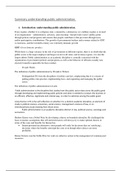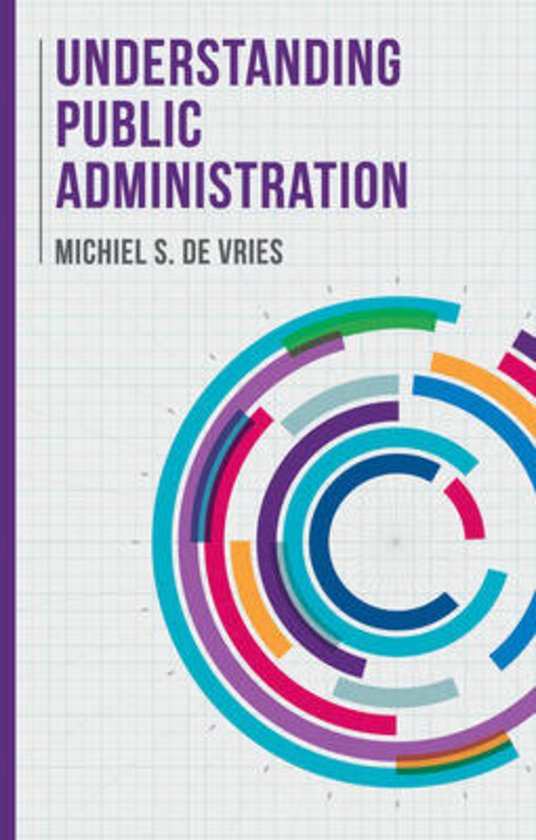Summary understanding public administration.
1. Introduction: understanding public administration.
Every regime, whether it is a religious state, a monarchy, a democracy or a military regime, is in need
of an organization – administrative, advisory, and executing - that provides (semi-) public goods
through policies and programs and ensures that people contribute to that provision through taxes
and/or participative contributions. The growth of governmental outlays and revenues related to GDP
is enormous, and the twentieth century saw extremely dramatic growth
GDP: Gross domestic product.
While there is a huge variance in the role of government in different regions, there is no doubt that the
public sector is the major employer and largest sector in all states, and in many regions, it is also the
largest debtor. Public administration as an academic discipline is centrally concerned with the
organization of government policies and programs as well as the behavior of officials (usually non-
elected) formally responsible for their conduct.
- Dwight Waldo.
The definition of public administration by Woodrow Wilson:
- Distinguished PA from the disciplines of politics and law, emphasizing that it is a means of
putting politics into practice, implementing laws, and organizing and managing the public
sector.
The definition of public administration in Latin:
Public administration is the discipline that studies how the public sector does serve the public good
through developing and implementing public policies and what is needed to conduct this business in
an efficient, effective, legitimate and rational way, in order to optimize serving the public good.
A key theme in PA is the self-reflection on whether it is a distinct academic discipline, an element of
study in political science, economics, social science, management sciences of law, or an
interdisciplinary study drawing from those areas.
Public administration is an academic discipline distinct in law, political science, sociology and
economics.
Herbert Simon won a Nobel Prize by developing a theory on bounded rationality. He challenged the
basic economic assumptions that self-interested actors will always try to make optimal choices in
terms of the costs and benefits for themselves.
• Simon presented an alternative: most people will settle for decisions that are 'satisficing';
decisions where the benefits outweigh the costs even though other choices are more
profitable.
Elenor Ostrom won the Noble Prize for work on collective action in the management of common pool
resources.
, 2. Why do governments exist and why study them?
The role of the public sector in society is a common subject of discussion and criticism, inspiring
debates on topics including taxation, inefficient public service delivery, inefficient public policies and
irrational decision making.
Merriam Webster's definition of government: a group of people that have the authority to
govern a country over the actions of the members, citizens or inhabitants of communities and
societies.
There are four different regimes:
• Kingdom.
• Religious state.
• Interest group dominance.
• Democracies.
One common feature that the different regimes have, is that they all need some organizational
capacity or an administrative apparatus.
Terminology.
State and government: a state consist a population, a territory, a government and sovereignty. The
state is also typically a nation. Government is part of a state.
The state (or nation): a nation-state comprises all its inhabitants, but not all inhabitants are part of
its government. People rarely protest against their nation-state, but they do against their government.
Territory: most territories are delineated within nations.
Population: can be defined as a group of persons who live on a commonly shared territory, but also
more specifically as a group of people who share complementary communication habits, at least part
of a common culture and language, have common understanding of many things and attach shared
meanings to words.
Sovereignty: the sovereignty of nation-states can also be the subject of dispute. Most nations are
recognized by other nations. This constitutes external sovereignty; independence and the right to self-
government. Internal sovereignty refers to the authority over a territory to rule and make and enforce
laws. Authority refers to a claim of legitimacy by which one's power or right to give orders, make
decisions and/or enforce obedience is supported.
Government: as a constituting element of the nation-state, is defined as the totality of political and
administrative organizations and institutions within that nation, authorized to allocate collectively
binding values and services.
Why people transfer authority to government.
There are five answers to the question:
− The nature of humankind.
− Not all the problems are individual problems.
− The evolution of civilization.
− Religious convictions.
− Forced on people.
Nearly every territory belongs to some kind of nation-state. One of the answers to the question 'why
people transfer authority to government' can be found in the nature of humankind.
, Human beings are social animals. Political scientist Mosca wrote " Men have the instinct for
herding together and fighting with other herds."
General notions have been reformulated into psychological theories such as social identity theory, in
which people need to identify with a group for their self-esteem, and hierarchy and power within these
groups are accepted as long as this contributes to their identity. Social dominance theory views
humans as having a biological drive for social inequality and an evolutionary past that predisposes
them towards hierarchy and competition between groups.
− Every individual has a degree of attraction to authoritarian social relations, and a tendency to
buy into the 'legitimating myths' deployed to defend them.
Social justification theory assumes that individuals need social structures in order to legitimize them.
− Individuals want to support the status and to see it as being there for a reason.
Not all the problems are individual problems. Many problems are shared by groups of individuals.
Collective action often results in some form of government because organization requires leadership.
According to Thomas Hobbes, if people did not organize, there would be a continuous struggle of all
against all, which would be detrimental for all. The need for collective action is the most basic reason
for an organization; organizations exist to fulfil purposes that a group of individuals have in common.
It is a kind of trade-off.
The evolution of civilization. The evolution from nomadic life dominated by hunter-gatherers to
settlers who developed agriculture and later on emergence of trade and the division of labour, resulted
in the emergence of cities, which were sometimes political centres, trade centres or religious centres.
Religious conviction. The belief in natural laws and divine order, substantiated by holy manuscripts,
supported the idea that leadership was the instrument of divine order to enforce divine laws.
Forced by people. The emergence of the government was done by people with the use of violent
actions or the threat of such violence. Individuals and groups differ in strength and the strongest
impose their will on the weaker.
The government also enforces taxes, beliefs, preferences and all collective goods on people, without
the latter of asking for or needing it. This is de most realistic explanation for the emergence of
nations, states and governments.
European powers exploited their nationals or colonies. Colonial powers were not interested in
providing the collective goods on behalf of their territories to resolve certain collective problems.
They rather benefit themselves by depriving the colonies of their wealth and natural resources.
Government stull find legitimacy on primarily the same five grounds. In many nations, the
government is still believed to be legitimized by divine powers or by its promotion of common
interests and the self-interest of the population. There are also still nations where the rule of force
dominates the rule of law.
The provision of collective goods to resolve collective problems forms the basic legitimacy of
any modern-day governments. Complex problems in many countries require more than simple
collective action for the protection of life and property against violent tribes and natural disasters.
The logic of collective action.
Government comes into existence through the organization of individuals or groups with common
interests who try to further those interests by creating a government. This government produces public
goods, through collective binding decisions for the benefit of all, to which all citizens are expected to
contribute and from which all citizens benefit.
• The production of public goods is highly controversial simply by virtue of the fact that they
are public.






